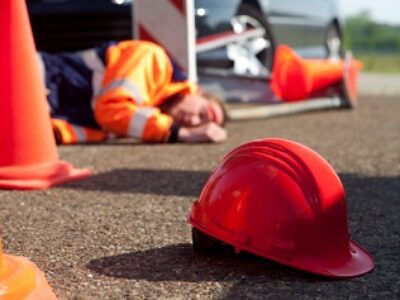Wildfire season is coming up in California. This means a good paycheck for you, and fighting fires provides a physical challenge you enjoy. You can also gain satisfaction by saving buildings, wildlife, and scenery from destruction. However, as our team at the Law Offices of Hussain & Gutierrez is aware, your job is also a dangerous one. You can face immediate injuries on the job as well as long-term illnesses resulting from inhaling toxic particles in the smoke.
Why Firefighters Are at Higher Risk of Long-Term Illnesses
Wildfire Today explains that after serving just 10 years on a project fire crew, firefighters are 22 to 24 percent more likely to die from ischemic heart disease, cardiovascular disease, or lung cancer than before they began fighting fires. After fighting wildfires for 15 to 20 years, your risk of dying from these diseases or other complications increases even more.
What’s in Wildfire Smoke? The Toxic Truth
The smoke from brush, forest, and structural fires contains toxic chemicals and particles, including:
- Sulfur dioxide
- Carbon monoxide
- Benzene
- Crystalline silica
- Particulate matter (PM2.5 and PM10)
These toxins are known to contribute to a wide range of respiratory and cardiovascular illnesses, and in some cases, even neurological damage. According to the CDC, these exposures increase risk for diseases that may not surface for years.
Symptoms of Toxic Smoke Exposure
After spending a significant time fighting fires, your symptoms resulting from toxins in smoke can range from:
- Confusion and memory loss
- Breathing difficulties
- Loss of cognitive abilities
- Irritation of the skin, eyes, and respiratory tract
Over time, you may develop numerous types of lung diseases or cancers, such as:
- Chronic obstructive pulmonary disease (COPD)
- Pulmonary fibrosis
- Lung carcinoma
- Occupational asthma
- Cardiac arrhythmia
Preventive Measures Firefighters Should Follow
One of the most important ways to avoid these devastating consequences when fighting wildfires is to:
- Rotate your shift out of smoke-heavy areas
- Limit the length of your shift
- Use certified respiratory protective equipment such as N95, P100, or SCBA (Self-Contained Breathing Apparatus)
- Stay current on safety training and hazard recognition protocols
- Use real-time air quality monitoring tools
- Participate in medical surveillance programs such as spirometry and pulmonary function tests, as recommended by NIOSH
Psychological Effects of Firefighting
Firefighters don’t just face physical risks. Long-term exposure to trauma, injury, and death also increases risk for:
- Post-Traumatic Stress Disorder (PTSD)
- Anxiety and depression
- Burnout syndrome
Mental health is an occupational hazard in high-risk jobs. Under California law, psychological injuries can be compensable if proven to be job-related.
Your Legal Protections as a Firefighter in California
California law provides several firefighter-specific legal protections, including:
- Presumption laws: Certain cancers and illnesses are presumed to be job-related under Labor Code 3212.
- Workers’ Compensation Benefits: Firefighters may be eligible for full medical coverage, lost wages, and disability benefits.
- Cal/OSHA Standards: Employers must comply with wildfire smoke safety regulations to reduce exposure risks.
- Legal protection from retaliation: If you file a workers’ comp claim, your employer cannot legally fire or discipline you for doing so.
What Should You Do If You’re Sick from Smoke Exposure?
- Seek Immediate Medical Attention
Have your symptoms assessed and documented by a healthcare professional.
- Report the Illness to Your Supervisor
Make a formal incident report.
- Document Exposure History
Track your locations, symptoms, and firefighting assignments.
- Speak With a Workers’ Compensation Attorney
Legal guidance ensures your rights are protected from day one.
Challenges Firefighters Face in Claiming Compensation
Even with presumption laws, many firefighters face:
- Denied claims due to “insufficient medical evidence”
- Delays in treatment approval
- Pushback from insurance carriers
- Retaliation or pressure from employers
If you’ve been denied, you still have legal options. A lawyer can help you appeal or reopen your case.
FAQs – Firefighter Wildfire Exposure & Legal Rights
1. Can I get workers’ comp if I develop cancer after firefighting?
Yes. Under California’s presumption laws, cancers linked to toxic exposure during service are often presumed job-related.
2. What diseases are covered under firefighter presumption laws?
These include lung cancer, heart disease, skin cancer, and certain gastrointestinal illnesses.
3. What do I need to file a successful workers’ comp claim?
You’ll need:
- Medical diagnosis
- Exposure documentation
- Incident reports
- Legal representation (recommended)
4. Can my employer fire me for filing a claim?
No. California labor law protects employees from retaliation related to workers’ compensation claims.
5. What if my claim is denied?
You have the right to appeal. We can help gather medical records, expert testimony, and other legal tools to fight back.
Protect Your Future. We’re Here to Fight for You.
If you’re a firefighter suffering from illness or injury due to wildfire exposure, don’t wait.
Contact the Law Offices of Hussain & Gutierrez, We fight for the rights of California’s first responders.
- Free consultation
- No fees unless you win
- Specializing in hazardous occupation claims
Schedule your free case evaluation today or call (888) 997-3701.



